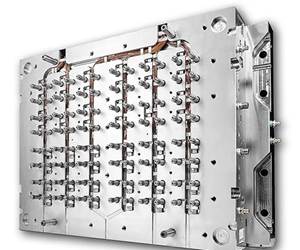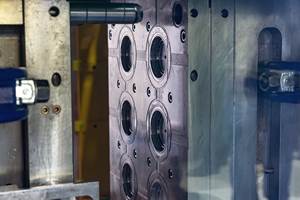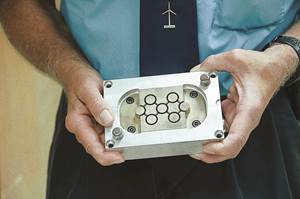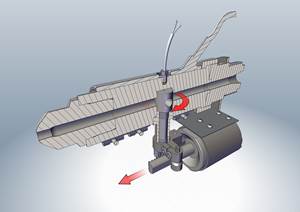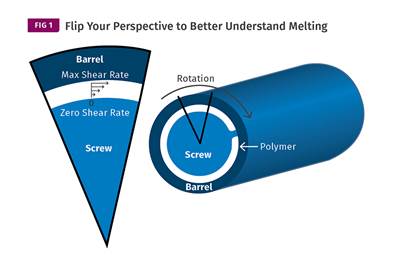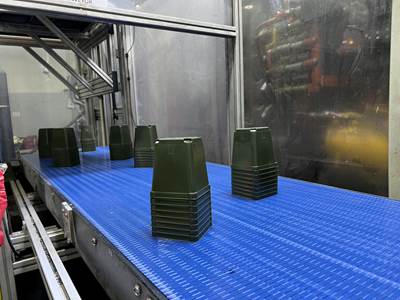All-Electric, Automated and Super-Efficient
The goal was to handle more different parts and materials and higher production volumes with fewer people and less inventory and floor space than any other plant in the company.
The goal was to handle more different parts and materials and higher production volumes with fewer people and less inventory and floor space than any other plant in the company. That was a tall order for designers of Plant 47 for Delphi Connection Systems, part of Delphi Corp.’s Packard Electric operations. The plant had to exceed the record of Delphi’s award-winning showplace plant in Cortland, Ohio.
The result: another trend-setting facility that more than meets the challenge. Delphi’s brand-new, $58-million, 190,000-sq-ft plant in Vienna Township, Ohio, produces almost 400 different parts for more than 100 customers, using 23 resin families and around 90 different compounds in 120 injection presses tended by only eight operators per shift. The highly automated, fully networked plant is yielding 15% higher throughput than Cortland (which has the same number of machines) with less than 1-ppm defects and 100% on-time deliveries.
Going all-electric
The new plant operates 24/7 to produce up to 1.4 billion parts a year—automotive connector housings, clips, clamps, and related components. These are made on 120 Fanuc Roboshot Si-B all-electric presses (plus four more in a lab area) supplied by Milacron, Inc., Batavia, Ohio. Milacron sources say this probably makes Plant 47 the largest all-electric molding plant in the world. It is also Delphi’s very first purchase of all-electric presses. Delphi evaluated different styles of machines and chose the electrics because of their energy efficiency and impressive production repeatability. Delphi felt the latter quality was particularly suited to its complex parts, which can have wall thicknesses under 1 mm together with large external features.
While electric machines can be pricey, Delphi says they actually lowered overall capital-investment needs at Vienna by more than $1.7 million in reduced machine cooling needs and other contributions to downsized utility infrastructure. Also, these machines pay off in energy savings of 11.5 million kwh/yr and eliminating the costs of hydraulic fluid, hydraulic-system maintenance, storing the fluid, and cleaning up potential spills.
Each machine is modified for Delphi with an interface to the auxiliary equipment in the manufacturing cell, an Ethernet hub, and special controls that are compatible with the plant-wide GE Fanuc Cimplicity manufacturing system, which ties virtually every piece of equipment in the plant to one control room. Each cell has a press-side granulator with sensors to detect the presence of material that needs to be ground, plus vacuum take-away of regrind to bins for reuse. The cell also has a barcode printer to produce labels for each container of finished parts, and the cell sends a signal for an automated guided vehicle (AGV) to pick up the parts and deliver them to the packaging and shipping areas.
Resin-handling showpiece
Delphi installed one of the largest and most sophisticated material handling systems in the U.S. The centrally controlled drying, blending, and conveying system was supplied by Baltimore based Novatec Inc. The system “talks” to the other systems within the facility via an Ethernet connection. “The level of integration Delphi wanted exceeded anything we’ve done in the past,” says a Novatec source. The system handles up to 32 materials simultaneously that can have different drying times and temperatures. System controls are designed to positively identify each material being used and ensure it is delivered to the proper location. Cross-contamination of materials is prevented through the use of a barcode matching system for the material, machine, and mold, and an automatic material selection system that downloads recipes to the presses.
Related Content
How to Optimize Pack & Hold Times for Hot-Runner & Valve-Gated Molds
Applying a scientific method to what is typically a trial-and-error process. Part 2 of 2.
Read MoreA Simpler Way to Calculate Shot Size vs. Barrel Capacity
Let’s take another look at this seemingly dull but oh-so-crucial topic.
Read MoreHow to Select the Right Tool Steel for Mold Cavities
With cavity steel or alloy selection there are many variables that can dictate the best option.
Read MoreKnow Your Options in Injection Machine Nozzles
Improvements in nozzle design in recent years overcome some of the limitations of previous filter, mixing, and shut-off nozzles.
Read MoreRead Next
People 4.0 – How to Get Buy-In from Your Staff for Industry 4.0 Systems
Implementing a production monitoring system as the foundation of a ‘smart factory’ is about integrating people with new technology as much as it is about integrating machines and computers. Here are tips from a company that has gone through the process.
Read MoreUnderstanding Melting in Single-Screw Extruders
You can better visualize the melting process by “flipping” the observation point so that the barrel appears to be turning clockwise around a stationary screw.
Read MoreProcessor Turns to AI to Help Keep Machines Humming
At captive processor McConkey, a new generation of artificial intelligence models, highlighted by ChatGPT, is helping it wade through the shortage of skilled labor and keep its production lines churning out good parts.
Read More


















